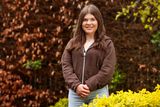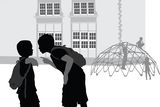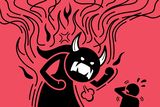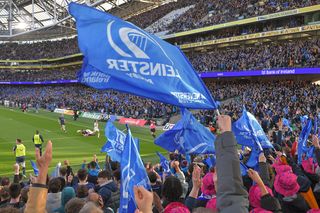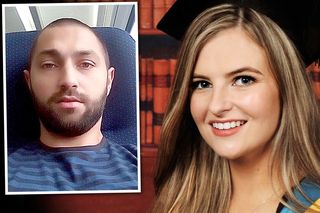'I have the same rare disease that killed my brother'
As Rare Disease Day falls this Saturday, Katie Woods tells her story of living with HHT - a genetic blood vessel disorder
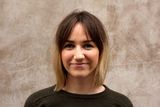

I was like all of the other kids at school, just that my doctor was in Cork and not in Dublin, even though I lived in Swords.
He was both my doctor and my brother Paul's doctor. Before Dr Adrian Brady could become our doctor, we had to do some tests and, if we passed, he could be our doctor.
A lot a kids can suffer nosebleeds but ours were different. Growing up with nosebleeds was normal in my house. Firstly, it wasn't just me but it was my mam and my brother too. And my aunties and uncles, my granddad, my great grandmother. Alarm bells.
My mam had spent the majority of both her pregnancies in bed with heavy nosebleeds and had to get blood transfusions. When my brother and I arrived, we too started bleeding from a really young age.
Katie's late brother Paul
In school, I would always have a tissue nearby in case of a bleed. The bleeds didn't just come when I got a football to the face. They might happen when I was washing my face, when I was warm, when I was dancing. Whenever. We could wake up with blood all over the pillowcase after a bleed during the night, although this was more common for my brother. At school, people would initially be a bit taken back at the sight of blood but, after a while, teachers and friends got used to it.
When I was 11, and Paul was 12, Dr Adrian ran some genetic tests to officially confirm what everyone already knew. His team looked at our family history and checked our lungs and our brains. Along with our parents, Dr Adrian helped to explain to us that we had tested positive for a disorder called hereditary hemorrhagic telangiectasia, or HHT.
HHT is a rare genetic blood vessel disorder that in the US is just as common as cystic fibrosis. This was the same disorder that had been running through my mam's side of the family. From what I understood, Dr Adrian was the superman of HHT.
I had regular medical appointments throughout my teens and continued to lead a completely normal life. Every now and then, I'd get a nosebleed - not as many as when I was younger - but I was well used to them. At this stage, I knew that I was one of the luckier ones.
Paul, for instance, would be more out of breath than the others when playing football, so the doctors kept a close eye on him. He had more weak blood vessels in his lungs than I did, so the doctors in Cork would undertake routine procedures on his lungs to embolise or "zap" the vessels.
If they weren't zapped, the weak blood vessels could grow and rupture. We were all a little worried but he was always fine and he was literally back up and running a week later and playing like the rest of the team.
The years went by, we finished secondary school and both of us went on to study at Dublin City University. There were certain things that I was told to avoid as they can trigger nosebleeds, such as spicy food and red wine and, because my lungs were affected, I was told never to scuba dive.
At college I was getting far fewer nosebleeds than before, and some of my friends didn't even know that I had HHT. All was going to plan, until one day it wasn't.
When I was in Granada, Spain, for my Erasmus year in translation studies, Paul was finishing up his final year studying environmental science. In early June 2012, after finishing his final exams, Paul went to Paris with his girlfriend to spend the month. However, on the night of June 7, he was rushed to hospital when one of the weak blood vessels in his lungs suddenly ruptured. Unfortunately, Paul never lived to see another day in his favourite city. He died at 22 years of age.
This sudden bleed came as a shock to my family and to the HHT specialists both at home and in the international community. It was extremely hard to deal with his death and to see my parents go through the loss of a child. I don't enjoy recalling this story. In fact, I am reluctant to tell it. I was only 21 and didn't really know anyone that had been in a similar situation, so that made it harder to talk about. I am 28 now and am very aware that there are other people with rare diseases, and without, that are in a much worse situation than I am. I'm also aware that it's still perfectly OK for me to feel sad.
Now when I get nosebleeds, they touch a nerve. They remind me of how HHT has changed my life, sometimes for the bad and sometimes for the good. My family found solace in establishing HHT Ireland, a patient-led organisation that supports patients and families with HHT in this country. Through the organisation, we have made great connections, formed lasting friendships and been able to help many other families in Ireland deal with HHT. Paul's death has shed much-needed light on HHT and has allowed us to raise awareness of the disorder and of how it can be treated.
Since graduating, I've moved to Barcelona. I've been in contact with HHT España, which has helped me to find an HHT superwoman nearby that treats patients just like me. I'm now in the system here in Spain and am called for regular check-ups to keep an eye.
If someone with HHT has children, there's a 50/50 chance that they will have HHT. Because of the strand of HHT that I have - there are two strands - if I want to have children in the future and ensure that they do not have HHT, IVF makes that possible. And although this is degenerative disorder, my nosebleeds are continuing to ease off. So, a future with HHT doesn't look too shabby after all.
Rare Disease Day is a day that I now celebrate. Whether you have HHT or any other rare disease, it's a great day to learn about rare diseases in Ireland!
An Easyguide to Rare Diseases in Ireland has just been published by the Rare Disease Taskforce to mark Rare Disease Day on Saturday, February 29. To download the Guide, visit Rare Diseases Ireland at rdi.ie. For more information on HHT Ireland, visit hhtireland.org
About HHT
⬤ Hereditary hemorrhagic telangiectasia is a hereditary genetic disorder of the blood vessels. It affects one person in every 5,000.
⬤ In a healthy individual, arteries and veins are connected by capillaries. In HHT patients, this connection is not always present, causing arterio-venous malformations (AVMs). These AVMs cause all the symptoms and complications of the disorder.
⬤ Frequent unexplained nosebleeds are the most obvious symptoms and they usually appear in more than one family member. 90-95pc of individuals with HHT will have nosebleeds by adulthood, but severity ranges from infrequent and minor, to daily and severe.
⬤ Other visible signs are tiny red dots on the skin, face, lips, tongue and fingertips, called telangiectases.
⬤ Invisible AVMs due to HHT can occur in vital organs such as the lungs, brain and gastrointestinal tract. They can be symptom-free or may cause severe and sudden complications
⬤ When HHT is suspected, it is recommended to contact a specialist centre in order to receive complete screening and an accurate diagnosis. HHT is a manageable disorder but only an early diagnosis can avoid the most dangerous complications.
Join the Irish Independent WhatsApp channel
Stay up to date with all the latest news





